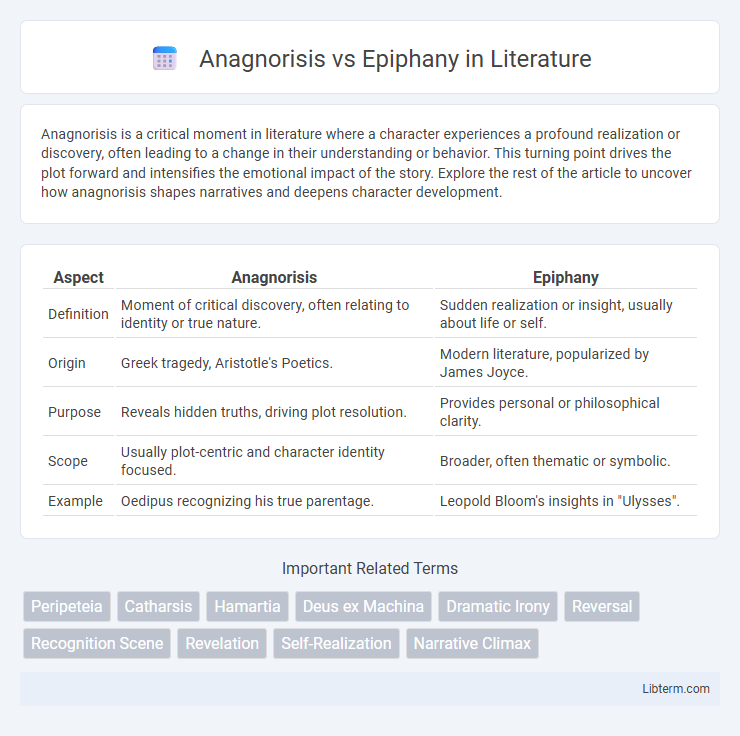Anagnorisis is a critical moment in literature where a character experiences a profound realization or discovery, often leading to a change in their understanding or behavior. This turning point drives the plot forward and intensifies the emotional impact of the story. Explore the rest of the article to uncover how anagnorisis shapes narratives and deepens character development.
Table of Comparison
| Aspect | Anagnorisis | Epiphany |
|---|---|---|
| Definition | Moment of critical discovery, often relating to identity or true nature. | Sudden realization or insight, usually about life or self. |
| Origin | Greek tragedy, Aristotle's Poetics. | Modern literature, popularized by James Joyce. |
| Purpose | Reveals hidden truths, driving plot resolution. | Provides personal or philosophical clarity. |
| Scope | Usually plot-centric and character identity focused. | Broader, often thematic or symbolic. |
| Example | Oedipus recognizing his true parentage. | Leopold Bloom's insights in "Ulysses". |
Understanding Anagnorisis: Definition and Origins
Anagnorisis is a critical moment of recognition or discovery in literature, originally defined by Aristotle in his Poetics as the protagonist's sudden awareness of a fundamental truth. This concept, rooted in classical Greek tragedy, often involves a shift from ignorance to knowledge that dramatically changes the course of the narrative. Understanding anagnorisis requires examining its role in plot development and character transformation within the framework of ancient dramatic theory.
What is an Epiphany? Key Concepts Explained
An epiphany is a sudden, profound realization or insight that changes a character's understanding of their situation, often triggering a transformation in their thoughts or actions. Unlike anagnorisis, which specifically refers to a critical moment of recognition or discovery about identity or relationships, an epiphany encompasses broader moments of clarity about life, values, or self-awareness. Key concepts of epiphany include the suddenness of the insight, its emotional impact, and its role in driving character development or plot progression.
Historical Context: From Greek Tragedy to Modern Literature
Anagnorisis, originating in Greek tragedy, refers to the critical moment of recognition or discovery often leading to the protagonist's reversal of fortune, prominently demonstrated in Sophocles' "Oedipus Rex." Epiphany, while related, evolved through modern literature to signify a sudden, profound insight or realization affecting characters' perception of life, popularized by writers like James Joyce. This historical progression highlights the shift from external revelations tied to fate and identity to internal, personal awakenings shaping character development and narrative style.
Core Differences Between Anagnorisis and Epiphany
Anagnorisis refers to the moment in a narrative when a character experiences a critical discovery or recognition, often relating to their true identity or the nature of their situation, typically leading to a reversal of fortune. Epiphany, in contrast, denotes a sudden and profound realization or insight that changes a character's understanding or perspective, but does not necessarily involve a dramatic plot reversal. The core difference lies in anagnorisis being tied specifically to recognition tied to the plot's turning point, while epiphany emphasizes personal, internal enlightenment without obligatory narrative consequences.
Literary Examples of Anagnorisis
In Sophocles' "Oedipus Rex," the protagonist's anagnorisis occurs when Oedipus realizes he has unwittingly killed his father and married his mother, marking a pivotal moment of tragic self-discovery. Shakespeare's "King Lear" showcases anagnorisis through Lear's recognition of his own folly and the true nature of his daughters after enduring suffering and betrayal. In "The Great Gatsby" by F. Scott Fitzgerald, Gatsby experiences a subtle anagnorisis as he confronts the unattainable reality of his idealized vision of Daisy, revealing the illusion behind his American Dream.
Notable Epiphanies in Popular Literature
Notable epiphanies in popular literature often mark a protagonist's moment of sudden insight or revelation, transforming their understanding of themselves or their circumstances. In James Joyce's "A Portrait of the Artist as a Young Man," the protagonist Stephen Dedalus experiences multiple epiphanies that catalyze his growth and self-awareness. Unlike anagnorisis, which centers on recognition of identity or true nature typically linked to plot resolution in tragedies, epiphany emphasizes a poignant, often personal awakening that propels character development or thematic depth.
Psychological Impact on Characters and Readers
Anagnorisis, a profound moment of critical discovery, triggers intense psychological transformation in characters by confronting them with truth that reshapes their identity or fate, often evoking deep empathy and reflection in readers. Epiphany, characterized by sudden insight or revelation, provides an immediate psychological breakthrough that alters characters' understanding or perspective, inspiring readers through its clarity and emotional resonance. Both literary devices engage psychological layers by facilitating self-awareness and cognitive shifts, enriching the narrative's emotional depth and reader engagement.
The Role of Anagnorisis in Plot Development
Anagnorisis serves as a crucial turning point in plot development by revealing a protagonist's true nature or the reality of their situation, often dramatically altering the story's trajectory. This recognition moment enhances character depth and intensifies conflict, propelling the narrative toward its climax. Unlike epiphany, which is often a sudden insight or realization, anagnorisis is tied specifically to identity and truth within the plot structure, grounding character motivations and resolutions.
Epiphany’s Influence on Character Transformation
Epiphany drives character transformation by triggering sudden, profound realizations that reshape their worldview and motivations, often leading to decisive action or altered behavior. Unlike anagnorisis, which centers on a critical recognition of identity or truth, epiphany broadens the character's understanding, revealing deeper insights about themselves or their circumstances. This catalytic moment propels narrative progression by deepening emotional complexity and fostering internal growth.
Anagnorisis vs Epiphany: Why the Distinction Matters
Anagnorisis and epiphany both represent moments of critical insight but differ significantly in narrative function and thematic depth. Anagnorisis involves the protagonist's recognition of a key truth related to identity or situation, often triggering a plot reversal, while epiphany is a sudden, profound realization that may inspire personal growth or philosophical understanding. Understanding this distinction enhances literary analysis by clarifying character development and the transformative impact of these revelations within storytelling.
Anagnorisis Infographic

 libterm.com
libterm.com